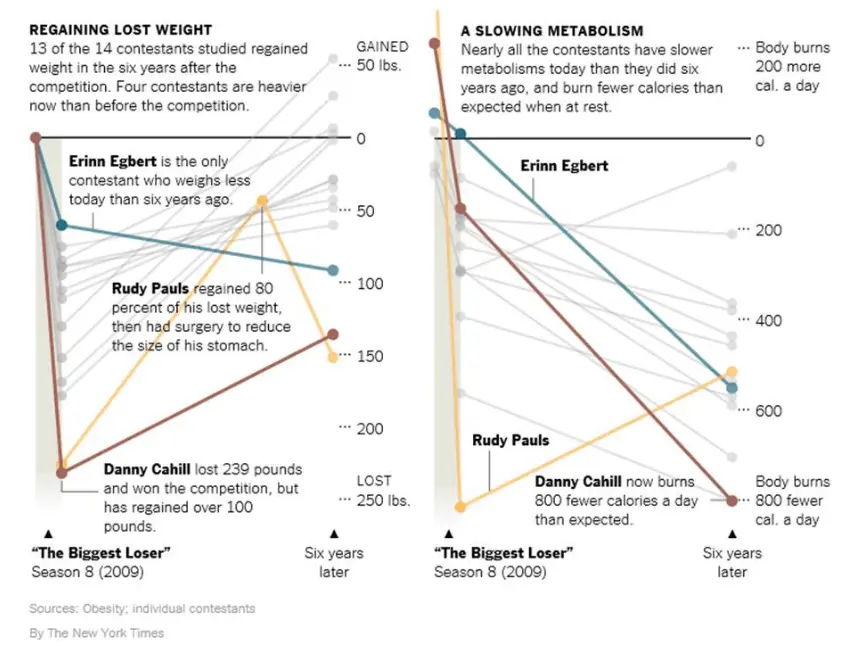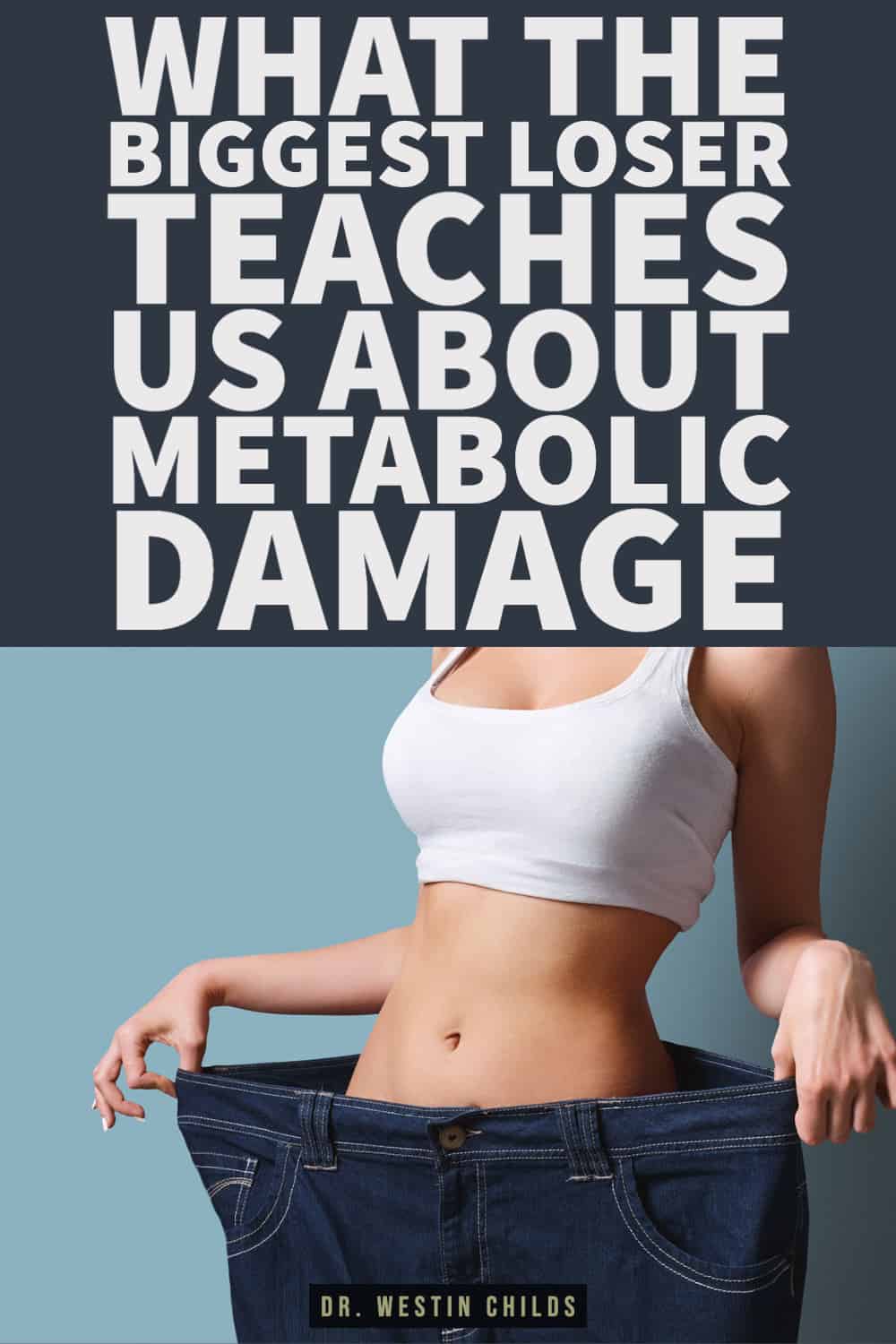The biggest loser contestants have damaged their metabolism and it has lasted 6 years!
This won’t come as a shock to those who have read my blog before (and really understand how to lose weight), but to people who still think that eating less and exercising more leads to weight loss will be VERY disappointed.
This new study shows (1) just what happens to the body when you restrict calories for a prolonged period of time.
There is no question that these people will lose weight in the short term, but that’s not really what we care about is it?
What we are looking for is a long-lasting way to achieve weight loss without damaging our metabolism and without damaging our thyroid.
Stay tuned because I’m going to talk about how to do just that and why the “biggest loser” approach leads to failure 99% of the time…
The “Biggest Loser” Study Explained
If this is the first time hearing about this let me fill you in:
A new study was just released which followed 16 of the Biggest Loser Contestants (only 14 followed up) over 6 years.
The study showed what happened to their metabolism and weight over this time period.
I’m sure you can guess what happened…
13 of the 14 contestants gained back the weight they had lost and several actually gained back more weight than when they started.

In addition, and this is probably the most important element, these contestants (with the exception of one contestant) showed damage to their metabolism that has lasted 6 YEARS.
That’s right:
The effects from 7 months of calorie deprivation (they live on a 1200-1400 calorie diet) and exercise daily, have resulted in 6 years of damage to their metabolism.
And we aren’t talking just a little bit either…

The average damage DURING the intense weight loss was 610 calories less than normal PER DAY, and 6 years later the average was 704 calories per day.
That means that these people are burning 600-700 calories less per day than the average person 6 years later.
Caloric Deprivation fails 99% of the time
I hope this makes sense why it’s impossible to lose weight with this kind of diet.
In the beginning, your body is able to lose weight as you reduce the total amount of calories consumed and up the exercise.
But what people don’t realize is that the body isn’t stupid.
Once it senses that calories have been reduced, it reduces the metabolism of the body and changes several key hormones (Thyroid and Leptin, which we will talk about later in this post) to CONSERVE energy.
Let’s put this into context:
Say you are making $100,000 per year and suddenly you get a pay cut and start making $50,000 per year.
Do you really think you are going to keep spending $100,000 per year until you completely run out of money?
Or are you going to cut back your spending to $50,000 so you don’t go into debt?
You know the answer.
And your body isn’t any different.

The crazy part is we all know this to be true (and even if you didn’t you can always refer back to this study (2) which proved it years ago), what we didn’t realize was how profound the damage of caloric deprivation was to our bodies.
We assumed that eventually our metabolism would kick back into gear and it would “heal”.
It turns out that even after 6 years the metabolism doesn’t actually “heal”, in fact, it may get a little bit worse.
This begs the next question:
Why does this happen?
Your Hormones are the Key to Weight Loss and Weight Gain
What you need to understand is that your hormones are SO much more important than any other factor when it comes to gaining weight and losing weight.
The reason that people gain weight back after caloric deprivation is not due to a lack of willpower or because they suddenly decided to stop exercising.
It’s because their hormones have created an environment where the body WANTS and NEEDS to gain back the weight it lost.
These hormonal changes are mediated through two important hormones:
1. Thyroid hormone
2. Lepin
It is well known that your Thyroid helps to determine your resting metabolic rate (3) (AKA your metabolism).
It’s also well known that caloric restriction results in reduced levels of free T3 (the active hormone) and elevated levels of reverse T3 (an anti-thyroid metabolite).

So, let me recap here:
Thyroid hormone is involved in maintaining your metabolism, and it is DAMAGED during periods of calorie restriction.
Do you see the problem here?
How many of you have undergone calorie-restricted diets, have impaired thyroid function, and are NOT on thyroid hormone replacement?
How many of you are told that you just need to eat less and exercise more, and once you lose weight your thyroid function will improve?
It’s just crazy! Especially when we have data and studies like the one mentioned above.
But wait, we aren’t done yet:
We still have leptin to talk about.
In addition to damaging your thyroid and metabolism, calorie restriction also leads to a condition known as leptin resistance.
Leptin helps to control your appetite, and leptin resistance results in further worsening of metabolism (4).
So now we have a deadly combination:
Lower than normal metabolism and higher than normal appetite.
Does this sound like a familiar scenario?
It’s no wonder that calorie-restricted diets fail 99% of the time (in the case of the biggest loser study it was 93%).
But despite these results, there is some hope…
A better approach to Weight Loss
I wouldn’t be very helpful if I didn’t include at least something to help give you some hope!
The truth is that there is a better way to approach weight loss and it’s something I’ve been talking about here for a long time.
I have developed several approaches that can actually help heal the metabolism, reverse hormonal damage from calorie-restricted yo-yo diets and help patients achieve LONG-lasting weight loss.
In order to do this, we actually have to break away from what is considered “conventional” wisdom.
#1. Heal the Metabolism
Almost every patient I see has some degree of metabolic damage from dieting in their life.
The most critical element to reversing metabolic damage is to replace thyroid hormone.
In most individuals that means higher doses of pure T3 medications.
This may be necessary for as long as 6 months! (At this point you can usually switch back to combinations of T4 and T3)
During this time I recommend following basal body temperature, resting heart rate, reverse T3 levels, and leptin levels.
All of these markers can be tracked as you progress through treatment and will help determine the necessary dose of thyroid hormone.
In addition to thyroid hormone, it can often be helpful to take medications that help reverse leptin levels quickly (5) and help maintain weight loss.
#2. Find the right Diet for you
When I talk about diet, I don’t mean dieting.
You need to find a diet that you can follow that doesn’t leave you hungry.
If you are hungry you are in caloric deprivation for your body (assuming normal leptin levels).
There is no magical diet and the ratio of fats/carbs/proteins must be teased out on an individual basis.
The most important rule to follow is this:
Make sure to eat real whole foods that aren’t processed and avoid refined carbohydrates/bread/sugars.
For more help with diet please see this post.
#3. Fix other Hormonal Problems
Most patients with difficulty losing weight have at minimum 2 hormones that are out of balance.
Usually the most prominent is the thyroid (because doctors tend to undertreat and misdiagnose hypothyroidism very frequently), and the second most common is insulin resistance.
The combination of insulin resistance and hypothyroidism is a very tricky situation.
But as you can see from the image below, it is impossible to burn fat when insulin levels are high.
In addition to insulin, you will also want to evaluate sex hormones (Testosterone, progesterone, estrogen) and Cortisol levels.
#4. Find the right balance of Exercise and Movement
While exercising more won’t help you necessarily help you lose weight directly it still has a positive effect on the hormone levels in your body.
Exercising helps to balance insulin levels and increase basal metabolic rate by increasing lean muscle mass.
For this reason, you will always want to incorporate a combination of high-intensity exercise and low-intensity exercise into your weekly regimen.
For those who aren’t on thyroid medication please beware!
Exercise can actually make you feel worse and put extra stress on the body which will result in more harm than good.
The Recap
If you take anything from this post make sure it is this:
Calorie-restricted diets do NOT result in long-lasting weight loss but they DO result in long-lasting damage to your metabolism and your thyroid.
If you’ve tried calorie-restricted diets in the past (like the HCG diet, the biggest loser diet, etc.) and now find it impossible to lose weight – you most likely have metabolic damage.
In order to reverse your metabolic damage, you will need to make sure you are on the right kind of thyroid medication (usually a combination of T3 hormone and a leptin sensitizer) for up to 6 months.
In addition, you will also want your other hormone levels checked and treated!
From my experience, it can take up to 1 month just to get the body back into balance before meaningful and lasting weight loss begins.
So just remember to be patient!
Do you have a damaged metabolism?
What have you done to lose weight after chronic, recurrent yo-yo dieting?
What type of thyroid medication has helped you the most?
Leave your comments below!
Scientific References
#1. http://onlinelibrary.wiley.com/doi/10.1002/oby.21538/abstract
#2. http://www.ncbi.nlm.nih.gov/pubmed/16391215
#3. http://www.ncbi.nlm.nih.gov/pubmed/18279014
#4. http://www.ncbi.nlm.nih.gov/pmc/articles/PMC2967652/
#5. http://www.ncbi.nlm.nih.gov/pubmed/25287751








